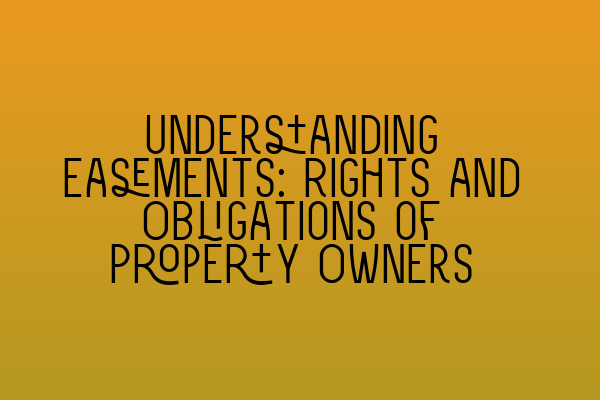Understanding Easements: Rights and Obligations of Property Owners
At SQE Property Law & Land Law, we believe in providing comprehensive and informative articles to help property owners navigate the complexities of property law in the UK. In this blog post, we will delve into the topic of easements and explore the rights and obligations associated with them.
An easement is a legal right that allows a person (the beneficiary) to use or access a certain part of another person’s property (the servient land). This right is typically granted for the benefit of the beneficiary’s own property. Easements can be created in various ways, including by agreement between the parties, by necessity, or by long use.
Understanding the rights and obligations related to easements is essential for property owners. Here, we will outline some key aspects of easements:
1. Types of Easements:
There are several types of easements recognized by law, including:
– Right of way: This allows the beneficiary to pass through the servient land.
– Right to light: This ensures that the beneficiary’s property receives sufficient natural light.
– Right to support: This provides the beneficiary’s property with necessary structural support from the servient land.
– Right to drainage: This allows the beneficiary to drain water from their property through the servient land.
2. Creation and Documentation:
Easements can be created by express agreement, through the use of a legally binding document such as a deed. It is crucial that any easement is properly documented and registered with the Land Registry to ensure its enforceability.
3. Rights and Obligations:
Both the beneficiary and the owner of the servient land have certain rights and obligations.
– The beneficiary’s rights include the right to use the easement in the specific manner agreed upon, the right to maintain and repair the easement, and the right to prevent any interference or obstruction from the owner of the servient land.
– The owner of the servient land has the obligation to allow the beneficiary to use the easement as specified, to not interfere with the beneficiary’s use of the easement, and to maintain any necessary support or drainage systems.
4. Alteration or Termination:
Easements can be altered or terminated under certain circumstances, such as when both parties agree to modify the terms, when the easement becomes unnecessary or impossible to use, or through a court order. It is important to seek legal advice before attempting to alter or terminate an easement to ensure compliance with the law.
Understanding easements requires careful consideration of the specific circumstances and legal requirements. It is always advisable to seek professional advice from a property lawyer to ensure that your rights are protected and your obligations are met.
For more information on property law and related topics, we recommend reading the following articles from our blog:
– “Updates in UK Property Laws: Key Changes and Implications”: Stay up to date with the latest changes in UK property laws and their implications.
– “Legal challenges in property transactions: A comprehensive guide”: A comprehensive guide to understanding the legal challenges that can arise during property transactions.
– “Navigating Lease Laws in the UK: Essential Guidelines for Tenants and Landlords”: Essential guidelines for tenants and landlords on navigating lease laws in the UK.
– “Dominate Property Law Questions: Avoiding Common Pitfalls”: Learn how to avoid common pitfalls when answering property law questions.
– “Land Law Revision Tips: Ace Your Exam Preparation”: Tips and strategies to help you ace your land law exam preparation.
At SQE Property Law & Land Law, we are dedicated to providing valuable resources and expert advice to help property owners navigate the intricacies of property law. Stay tuned for more informative content and feel free to contact us for any inquiries or legal assistance you may need.
